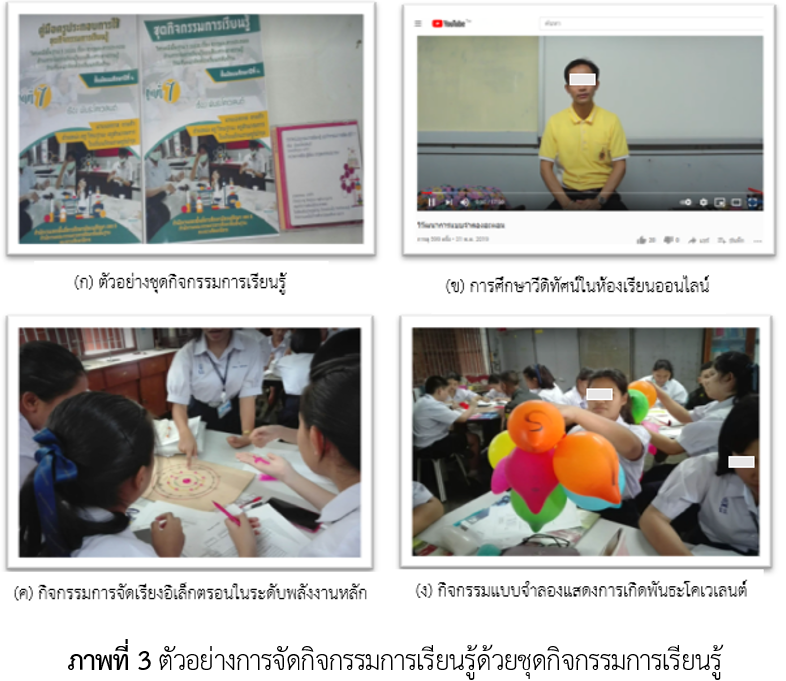การพัฒนาชุดกิจกรรมการเรียนรู้ เรื่อง ธาตุและสารประกอบ โดยการจัดการเรียนรู้แบบสืบเสาะหาความรู้ร่วมกับแนวคิดห้องเรียนกลับด้าน สำหรับนักเรียนชั้นมัธยมศึกษาปีที่ 4
Main Article Content
บทคัดย่อ
การวิจัยครั้งนี้มีวัตถุประสงค์ 1) เพื่อหาประสิทธิภาพของชุดกิจกรรมการเรียนรู้ เรื่อง ธาตุและสารประกอบ โดยการจัดการเรียนรู้แบบสืบเสาะหาความรู้ร่วมกับแนวคิดห้องเรียนกลับด้าน 2) เพื่อเปรียบเทียบผลสัมฤทธิ์ทางการเรียนด้วยชุดกิจกรรมการเรียนรู้ที่พัฒนาขึ้น และ 3) เพื่อประเมินความพึงพอใจของนักเรียนต่อการเรียนด้วยชุดกิจกรรมการเรียนรู้ที่พัฒนาขึ้น โดยกลุ่มตัวอย่าง คือ นักเรียนชั้นมัธยมศึกษาปีที่ 4 โรงเรียนแห่งหนึ่งในจังหวัดราชบุรี ปีการศึกษา 2560 จำนวน 34 คน ได้มาจากการเลือกสุ่มอย่างง่าย เครื่องมือที่ใช้ในการวิจัยได้แก่ ชุดกิจกรรมการเรียนรู้ แบบทดสอบวัดผลสัมฤทธิ์ทางการเรียน และ แบบประเมินความพึงพอใจ สถิติที่ใช้ในการวิเคราะห์ ได้แก่ ค่าเฉลี่ย ค่าร้อยละ ส่วนเบี่ยงเบนมาตรฐาน และการทดสอบค่าที (t-test) ผลการวิจัยพบว่า ชุดกิจกรรมการเรียนรู้ เรื่อง ธาตุและสารประกอบ โดยการจัดการเรียนรู้แบบสืบเสาะหาความรู้ร่วมกับแนวคิดห้องเรียนกลับด้าน ในครั้งนี้มีประสิทธิภาพเท่ากับ 81.39/81.57 ซึ่งสูงกว่าเกณฑ์ที่ตั้งไว้ที่ 80/80 นักเรียนมีผลสัมฤทธิ์ทางการเรียนหลังเรียน (mean = 24.47, S.D. = 4.20) สูงกว่าก่อนเรียน (mean = 16.00, S.D. = 2.64) อย่างมีนัยสำคัญทางสถิติที่ระดับ .05 และนักเรียนมีความพึงพอใจต่อการเรียนด้วยชุดกิจกรรมการเรียนรู้นี้อยู่ในระดับมาก (mean =4.48, S.D. = 0.22)
Article Details
วารสารวิทยาศาสตร์และวิทยาศาสตร์ศึกษา (JSSE) เป็นผู้ถือลิสิทธิ์บทความทุกบทความที่เผยแพร่ใน JSSE นี้ ทั้งนี้ ผู้เขียนจะต้องส่งแบบโอนลิขสิทธิ์บทความฉบับที่มีรายมือชื่อของผู้เขียนหลักหรือผู้ที่ได้รับมอบอำนาจแทนผู้เขียนทุกนให้กับ JSSE ก่อนที่บทความจะมีการเผยแพร่ผ่านเว็บไซต์ของวารสาร
แบบโอนลิขสิทธิ์บทความ (Copyright Transfer Form)
ทางวารสาร JSSE ได้กำหนดให้มีการกรอกแบบโอนลิขสิทธิ์บทความให้ครบถ้วนและส่งมายังกองบรรณาธิการในข้อมูลเสริม (supplementary data) พร้อมกับนิพนธ์ต้นฉบับ (manuscript) ที่ส่งมาขอรับการตีพิมพ์ ทั้งนี้ ผู้เขียนหลัก (corresponding authors) หรือผู้รับมอบอำนาจ (ในฐานะตัวแทนของผู้เขียนทุกคน) สามารถดำเนินการโอนลิขสิทธิ์บทความแทนผู้เขียนทั้งหมดได้ ซึ่งสามารถอัพโหลดไฟล์บทความต้นฉบับ (Manuscript) และไฟล์แบบโอนลิขสิทธิ์บทความ (Copyright Transfer Form) ในเมนู “Upload Submission” ดังนี้
1. อัพโหลดไฟล์บทความต้นฉบับ (Manuscript) ในเมนูย่อย Article Component > Article Text
2. อัพโหลดไฟล์แบบโอนลิขสิทธิ์บทความ (Copyright Transfer Form) ในเมนูย่อย Article Component > Other
ดาวน์โหลด ไฟล์แบบโอนลิขสิทธิ์บทความ (Copyright Transfer Form)
เอกสารอ้างอิง
Academic Department, Ratanaratbumrung School. (2016). Student achievement analysis report Academic year 2016 (in Thai). Ratchaburi: Ratanaratbumrung School.
Anegasukha, S. (2011). Statistical methods for research. 4th ed. (in Thai). Chon Buri: Education, Burapha University.
Dechakupt, P. (2011). Learner-focused teaching is key: concept teaching methods and techniques 1 (in Thai). Bangkok: Academic Quality Development (PW).
Dengwansri, N., Suntarak, P., Phonchaiya, S., and Wuttisela, K. (2018). Effects of cooperative learning incorporated with application on the Android operating system to learning achievement on periodic table for grade 10 students (in Thai). Journal of Science and Science Education, 1(1), 61-73.
Institute for the Promotion of Teaching Science and Technology. (2012). Science Evaluation Assessment. Bangkok: Se-Education.
Kheawpra-in, D. (2017). The development of learning achievement in biology and research skills for 10th grade student taught by research-based learning with flipped classroom (in Thai). Veridian E-Journal, 10(2), 392-408.
Lakat, P. (2016). Construction of learning activity package for the flipped classroom entitled “Basic Multimedia” for Mathayomsuksa 5 students, Wiangjedeewittaya school (in Thai). Kasalongkham Research Journal, 10(1), 147-160.
Meela, P. and Artdej, R. (2017). Model based inquiry and scientific explanation: Promoting meaning -making in classroom (in Thai). Journal of Education Naresuan University, 19(3), 1-15.
Muangmek, S. (2016). The study of science learning result and attitudes toward chemistry learning on acid-base for Matthayomsuksa 5 students by discovery method and cooperative techniques (in Thai). Master’s Thesis. Pathumthani: Rangsit University.
Namso, V., Jansawang, N. and Kudthalang, N. (2013). The development of instructional analytical thinking packages on element and compound of science learning substance for Mathayomsuksa 4 student (in Thai). Graduate Studies Journal, 10(50), 79-85.
National Institute of Education Testing Service, (2017). Summary of basic national education test results (O-NET), grade 12, Academic year 2017(in Thai). Retrieved 20 April 2017, from NIETS: https://bit.ly/35Cbr9C.
Office of the National Economic and Social Development Council. (2016). National Economic and Social Development Plan No. 12 (2017-2021) (in Thai). Retrieved 20 April 2017, from NESDB: https://bit.ly/3i9K7ES.
Pananchai, K. and Supasorn, S. (2020). Development of grade-10 students’ conceptual understanding of ionic compound by using inquiry learning in conjunction with particulate models (in Thai). Journal of Science and Science Education, 3(2), 165-176.
Panich, V. (2012). The way to create learning for 21 st century students (in Thai). Bangkok: Sodsri-Saritwong Foundation.
Rachatatanakul, P. (2015). The development of multimedia instruction package on chemical reactions by inquiry based learning and KWLH Plus with flipped classroom to development science project ability and scientific mind for tenth grade students (in Thai). Veridian E-Journal, 8(1), 319-332.
Seubsom, K. and Meeplate, N. (2017). The development of a flipped classroom with the integration of multimedia classroom teaching through google classroom (in Thai). APHEIT Journal, 6(2), 118-127.
Sriphon, P. (2013). The study of learning achievement and scientific attitude in chemistry for grade 10 Students using the Inquiry cycle (5E) learning method together with the cooperative learning method
STAD technique (in Thai). Journal of Education and Social Development, 9(1), 71-81.
Sukpiti, B. (2004). Evaluation of new learning (in Thai). Nakhon Pathom: Education, Nakhon Pathom Rajabhat University.
Supkul, K., Sahatsathatsana, C. and Sungsrikaew, P. (2020). The development of Flipped Classroom learning activities integrated with the Facebook of mathematics for grade-8 students (in Thai). Journal of Science and Science Education, 3(2), 125-133.
Thailand Development Research Institute. (2014). The strategy for basic education reform to be responsible (in Thai). Retrieved 20 April 2017, from TDRI: https://bit.ly/2LP20wu.
Tipchai, A., Meewong, C., Wuttisela, K. and Supasorn, S. (2019). Grade-10 students’ conceptual understanding of covalent bonding and molecular shapes from inquiry learning by using physical models (in Thai). Journal of Science and Science Education, 2(1), 43-56.
Wangsrikoon, A. (2014). Thailand education for 21 st century: productivity and development guidelines (in Thai). Humanities and Sciences Journal of Graduate School, 8(1), 1-17.


